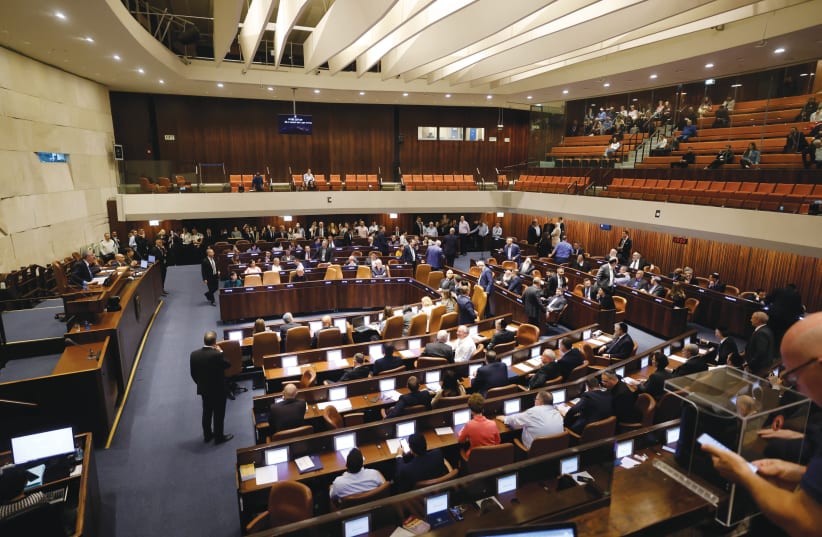On Friday afternoon, December 10, 1976, some 3,000 Israelis craned their necks skyward and watched as the state’s first three F-15 fighter jets touched down, launching a new era of Israeli air power. Prime minister Yitzhak Rabin, members of the 17th government and top IDF brass hailed the occasion as a holiday.
The ceremony dragged on until dark, after the Sabbath had already started. This raised an uproar among haredi MKs and some National-Religious MKs, and just 12 days later Rabin’s government fell.
Israel’s governments over the years rose and fell for a myriad of reasons, and any prediction about what will happen to the incoming 37th government has about as much a chance of being correct as a Knesset member has to finish a speech without someone trying to shout him or her down.
Yet the past six weeks of coalition negotiations provide a basic picture of the incoming government’s fault lines and the challenges returning prime minister Benjamin Netanyahu will face in holding it together.
Six parties will make up the incoming coalition: the Likud, Shas, United Torah Judaism (UTJ), the Religious Zionist Party (RZP), Otzma Yehudit and Noam.


The coalition will be even more homogeneous than Netanyahu’s right-wing government between 2015 and 2019, as it does not have a party like Kulanu to the Left of the Likud. This, of course, at a bird’s-eye view, is incomparable to the eight parties that made up the previous coalition, and the diametrically opposed views that it contained.
The previous coalition had different factions pulling in different directions, and it eventually tore apart. The fact that it lasted as long as it did was an achievement in and of itself.
And yet, one thing that has been evident during the prolonged coalition negotiations is that this coalition will also contend with forces going in a number of directions, which may end up tearing it apart as well.
The dynamic that has become apparent as the negotiations progress is that the Likud is trying to apply the brakes to many of its partners’ far-fetched ideas – but not to slam on them too hard, so that the partners don’t jump ship. This dynamic likely will continue during the incoming government’s tenure.
What are some of the major points of tension between the Likud and its partners that could end the government’s tenure?
Ben-Gvir – a walking land mine?
The largest threat to the incoming government’s longtime survival is Otzma Yehudit chairman Itamar Ben-Gvir, soon-to-be national security minister.


Ben-Gvir is known for his provocative behavior and his tendency to show up at sensitive flash points, such as Sheikh Jarrah, the Temple Mount and sites of terrorist attacks moments after the attacks occur. At these locations he often proceeds to rail against the government, terrorists and sometimes Arabs in general.
Ben-Gvir is a media phenom and perhaps even eclipses media-master Netanyahu himself. Unlike Netanyahu, during the election campaign Ben-Gvir repeatedly participated in interviews on all of Israel’s major media outlets, supplying countless viral moments and controversial statements and remaining incessantly in the public eye.
Ben-Gvir does not fear the Likud’s scare tactics – creating controversy surrounding an opponent and then amplifying it on social media. His Twitter account responds in kind to these viral attacks and only seems to draw more attention and interest.
Ben-Gvir seems already to have quietly stepped away from two central campaign themes – giving soldiers and police officers immunity over actions committed during operational situations, and changing the rules of engagement so that law enforcers can use force with less restraint.
Instead, the Otzma Yehudit chairman is focusing on a law to expand his authority over the police – a move that may enable him to bring some of his policies into the police through a back door. The law as Ben-Gvir proposed is currently encountering serious legal hurdles. But whether or not the law passes, there are some actions that, if he takes them as a minister, may lead to chaos and violence – especially regarding the Temple Mount.
Any flare-up in the security situation following a visit by Ben-Gvir to the site will serve as fodder for the opposition to bash Netanyahu. Netanyahu may eventually need to respond – and if the situation repeats itself, he may need to take more drastic measures to rein in his national security minister. Will Ben-Gvir agree to any such measures? Perhaps, but he may choose to take his six seats and ditch the coalition, leaving Netanyahu without a majority.
Smotrich – proven redlines
A second potential threat to Netanyahu’s government may come from RZP chairman Bezalel Smotrich. Smotrich proved in 2021 that he had redlines that he was not willing to cross in order to form a coalition, when he flat-out refused to enter a coalition with Ra’am – a refusal that eventually led to the formation of the outgoing Bennett-Lapid government.
Netanyahu will be wary not to lose Smotrich. But Netanyahu’s flexibility may also have its limits, especially with regard to the West Bank.
If the coalition agreements pass as they currently stand, Smotrich and fellow party member MK Orit Struck will be able to affect Israel’s policies in the West Bank – Smotrich as a minister within the Defense Ministry responsible for the Coordinator of Government Activities in the Territories and the Civil Administration, and Struck as “national missions minister” – a new name for the Settlements Ministry.
Smotrich wants to increase enforcement of the law do deal with illegal Palestinian construction in Area C, while also operating on behalf of the West Bank’s Jewish citizens and settlements. A key question is how much freedom Smotrich will have to carry out his policies. He likely will not be able to do whatever he wants under presumptive incoming defense minister MK Yoav Gallant, but even an actualization of some of his policies may lead to international repercussions – especially vis-à-vis the US.
Netanyahu will not be able to disregard American concerns over such policies, at least as long as the Biden administration remains in power. At stake is the already changing attitude within the Democratic Party toward Israel and, on a strategic level, Israel’s alliance with the transatlantic superpower.
If Netanyahu defers too much to such concerns, Smotrich will not stay on board for long. His seven seats are also enough to break the Likud’s majority, and may prove a deciding factor in the government’s survival.
United Torah Judaism – a constant headache?
UTJ has established itself as the toughest negotiator during the past few weeks. The party refused to sign an interim agreement and its demands are varied, detailed and numerous.
The central issue – as it has been for the past few decades – is haredi military or national service. UTJ demanded to reenact the Tal Law of 2002, which allowed haredim an exemption from service after a number of years of yeshiva study. The law’s rationale was to encourage those who did not wish to remain in yeshivas to enter the military or national service, but this did not occur, and the law was eventually deemed unconstitutional by the High Court, as it disproportionately violated the rights of non-haredi citizens.
The High Court may rule this way again – hence, enter a second major demand: the override clause, which would enable the Knesset to re-legislate laws that were struck down by the High Court.
Reports on Thursday indicated that the Likud and UTJ had reached a compromise: The Knesset will first legislate a Basic Law that encodes Torah study as a national value. The sides will then proceed to a haredi draft law, which will serve as a precondition for UTJ supporting the budget. If the draft law is eventually challenged in the High Court, UTJ hopes to defend its legality with the aforementioned Basic Law. This solution also renders the override clause less urgent for UTJ.
Most of UTJ’s politicians are experienced and know the importance of avoiding a public outcry that may pressure Netanyahu into backing away from agreements. But another of its demands – to significantly raise funding for private haredi schools without an accompanying commitment to teach “core” secular subjects such as English and mathematics – will probably do just that. In fact, this already occurred. Netanyahu, prior to the election, convinced parts of UTJ not to apply for an Education Ministry tender. The tender offered the provision of significant funding to haredi private schools, on the condition that their students study and pass state-issued exams in core subjects.
The funding for the haredi private school system, as well as an already agreed-upon raise in stipends of full-time yeshiva students, could cost billions of shekels.
The incoming coalition echoed the claim that the government had handed Ra’am’s Mansour Abbas NIS 53 billion. This was a well-documented spin, as this number included funds related to a number of separate projects in the Arab sector, including a NIS 30b. five-year plan, a separate NIS 1.5b. plan to fight crime, and more. The Social Equality Ministry recently published that it had so far spent approximately NIS 4.5b. out of the alloted NIS 30b., with the funding spread throughout the government ministries for programs relating to education, housing, policing and more.
The opposition may launch a similar spin. Instead of paying Abbas, the government is selling out to the haredim, it may argue. This is an argument that could resonate among many Israelis, including many Likud voters.
The Likud and UTJ will likely continue to negotiate out of the public eye throughout the government’s tenure. After a year-and-a-half, the ever-practical UTJ will not ditch the coalition easily and will be willing to make concessions. But it may be a constant headache for Netanyahu, taking up his time and energy – and perhaps may be the force that sets off a domino effect that could lead to the government’s demise.
Shas and Noam – ally versus liability
Shas and Noam are not parties that constitute a serious threat to Netanyahu’s government, each for its own reasons.
Shas chairman MK Arye Deri and Netanyahu are close allies and have cooperated closely for years. As the largest party in the coalition after the Likud, Shas also received a nice chunk of the governmental pie, with Deri himself expected to serve simultaneously as interior minister and health minister for the first two years, and as finance minister for the final two years.
The Likud and Shas did not experience crises during the coalition negotiations – in fact, a leak regarding a supposed “shouting match” between Netanyahu and Deri ended up being a spin that was planned ahead of time.
It seems that, barring any surprises, the two parties will work well together, and it is hard to envision a scenario in which Deri would bring down the government.
Noam is a different matter. Chairman Avi Maoz is already a big headache for Netanyahu, after it was revealed that Maoz, who is an open homophobe and chauvinist, would become a deputy minister in the Prime Minister’s Office responsible for the Education Ministry’s external pedagogical programs.
Netanyahu and the Likud were under fire for nearly a week, and ensuing comments by Maoz against the LGBT community and the “progressive insanity” only fed the flames.
The important thing to remember is that Maoz is a one-man party and has no leverage over Netanyahu. He will not affect the government’s survival, since it really does not matter whether he ditches the coalition at any point.
Maoz has already showed signs of lowering his profile – he ceased receiving questions from reporters or interviews – and understands that it will not take much to find himself an opposition backbencher.
